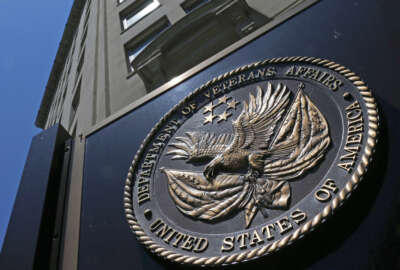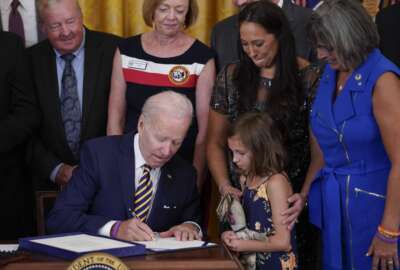

VA Secretary Denis McDonough, in an all-staff email sent Wednesday, said the department will require employees with telework agreements in the National Capital...
The Department of Veterans Affairs is planning to bring its employees back into the office more regularly this fall, and is setting a new minimum requirement for in-person work.
VA Secretary Denis McDonough, in an all-staff email sent Wednesday, said the department will require employees with telework agreements in the National Capital Region to work a minimum of five days in the office each two-week pay period.
The VA will implement the new in-office requirements in early fall, but McDonough said a specific effective date will be announced within the coming weeks, “based on our coordination with other federal agencies.”
McDonough said President Joe Biden declaring an end to the COVID-19 National Public Health Emergency on May 11 means “we can return to the office more regularly to work together in person rather than virtually.”
“I understand this change will be difficult, as the change to telework was very difficult in 2020. Working together we will again lead the federal workforce as we address this new challenge,” McDonough wrote.
McDonough told reporters at a press conference that the VA has spent months figuring out the right ratio of in-person work while keeping workplace flexibilities in place.
“We’re looking at what are the attributes of a highly effective workforce. What is the data that affirms that highly effective workforce? So we’ll be building that out between now and the fall.”
McDonough said the new in-office requirements strike a balance, and ensures VA employees are working in the office “at least as much as they’re in flexible work arrangements.”
“I think we will have some of our workforce who are disappointed,” McDonough said, but added that much of the VA workforce has been working in-person every day since the start of the COVID-19 pandemic.
VA is announcing its return-to-office plans a few weeks after the Office of Management and Budget issued a memo telling agencies to “substantially increase meaningful in-person work at federal offices,” particularly at the headquarters levels.
The OMB memo, however, reminds agency managers and supervisors that workplace flexibility policies remain “an important tool in talent recruitment and retention.”
The Office of Personnel Management, in an April 18 memo, told federal chief human capital officers that it was ending its “open with maximum telework flexibility” operating status that had been in place since the early days of the COVID-19 pandemic.
McDonough told staff he plans to have lunch once a week in the veterans canteen at the VA Central Office, and has invited employees to ask him questions or raise concerns about in-office work requirements.
“I did hear some pushback at lunch, and my guess is I’m going to hear pushback on my email. And that’s really good. I want to be a part of an agency that has a free flow of information from our employees,” he said
McDonough said VA is also planning a review of remote positions assigned to the National Capital Region, “to ensure that the remote categorization is appropriate for the position description, and that these determinations are consistent across the workforce.”
“One of the things that I think we have to do is just take a step back and understand what is what billets are telework, what billets are remote, and how does that match with what the needs of our veterans are,” McDonough told reporters.
“I say all the time that we’re a veteran-centric organization, and we ought to be making our decisions off that, rather than how the decisions were made in the height of the pandemic,” he added.
The VA is starting its transition to more in-person work with headquarters employees and equivalent employees whose official worksite is the VA Central Office or other worksites within the Washington, D.C. metro area.
McDonough said there are no changes at this time for VA employees outside the National Capital Region, “though we will continue reviewing our workplace posture in all locations.”
“This change will allow us to spend more time in the office together, learning from one another and strengthening our culture while preserving flexibility, something on which VA has always led — and will continue to lead,” McDonough wrote.
McDonough said the VA is focusing on increasing in-person work for the National Capital Region to ensure headquarters employees are “the best possible partners” for a majority of the VA workforce that’s outside the D.C. metro area.
The VA workforce, he added is “overwhelmingly in the field,” and that those employees in the field are the primary point of contact for veterans.
McDonough said the Veterans Benefits Administration is more productive now in terms of claims processed and the time-to-process, than in pre-pandemic times, and will closely monitor productivity levels as more employees return to the office more regularly.
“When we’re performing at this high a level, in the field, and we can demonstrate productivity like this — and we are seeing returns like we are seeing on the PACT Act, for example — we’re going to defend their right to be able to continue to work in those more flexible settings,” McDonough said.
VBA is preparing for another record-breaking year for processing benefits claims. The agency processed a record 1.7 million benefits claims in FY 2022, but the agency is processing 15% more claims so far this year, compared to the same period last year.
“The bottom line is we’re going to do what we think is necessary to best serve veterans and their families at the same high levels we’ve been able to do over the past two years,” Under Secretary for Benefits Joshua Jacobs told reporters on Monday.
The VA has been operating under a strategy of downsizing its office space, but McDonough said those plans on are now hold, as the VA determines how much space it will need for a more in-office workforce.
McDonough said he’s been reaching out to VA employees over the past few weeks to hear their views on an increased in-office presence.
“I heard many concerns, and I acknowledge those concerns. However, I believe that the benefits of having more time in the company of our colleagues outweigh the costs,” McDonough said. “I strongly believe that increasing in-person engagement will enhance problem-solving, spark even more creativity, and strengthen the connections that make us more productive and successful in our core mission to support veterans.”
McDonough is telling supervisors not to begin talks about increased in-person work with VA bargaining unit employees until VA fulfills its collective bargaining obligations with federal employee unions.
“Those of you who are supervisors, the key leaders at VA, will get additional information and guidance in the coming day,” McDonough wrote in his email. “There will be questions to answer, and challenges to overcome, and we will rely on your leadership in this effort.”
The VA is giving its workforce advanced notice of its return to office plans to give employees time to make arrangements for family care, elder care or other personal needs.
Copyright © 2025 Federal News Network. All rights reserved. This website is not intended for users located within the European Economic Area.
Jory Heckman is a reporter at Federal News Network covering U.S. Postal Service, IRS, big data and technology issues.
Follow @jheckmanWFED



